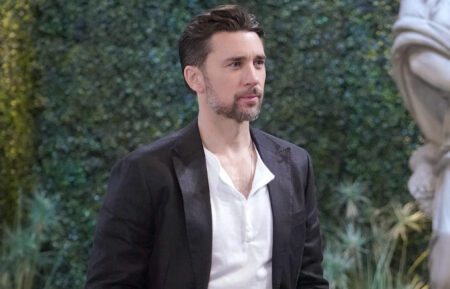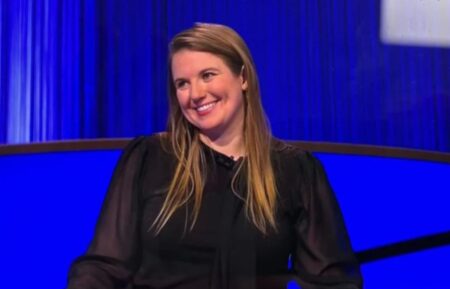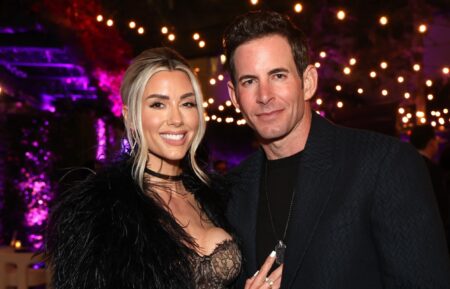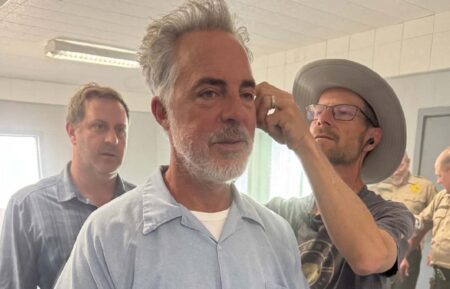Cameron Esposito and Rhea Butcher on Being Married Comedians on TV and In Real Life
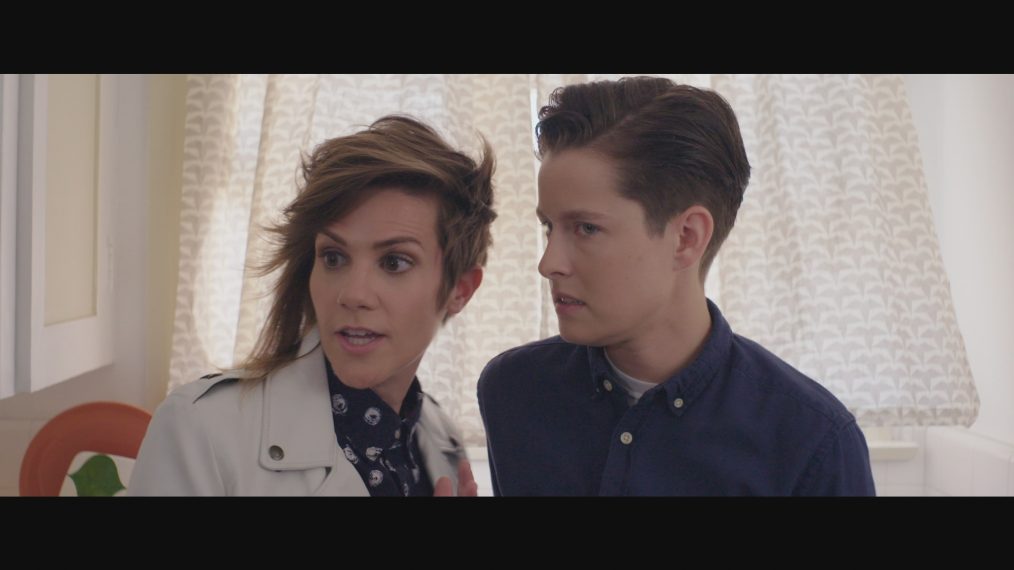
When Seeso approached Cameron Esposito and Rhea Butcher, who are not only a married couple but also both stand-up comedians, the streaming service wanted to do a show based on the live stand-up show they host in L.A., with interstitials that showed their home life. Once they started writing, Esposito tells TV Insider, “really where our interest was was in that coming home with the two of us angle.”
The result is the comedy series Take My Wife, which debuts on the service on August 11. It’s about their marriage, the difficulties faced by women in comedy, and what happens when someone starting out in comedy, like Butcher, has to struggle out of the shadow of her more well-known wife. It’s a funny and surprisingly sweet show, one that doesn’t stray all that far from the couple’s real life.
Esposito and Bucher spoke to us about the show, why it’s refreshing to have a show with lesbians who don’t end up dead, and why issues of gender and sexuality will always be a part of the show’s DNA. First, watch an exclusive clip from the show:
What made you two decide to do a show based on your marriage and life?
Cameron Esposito: From when Rhea and I first met each other and we were just working together, we have always wanted to create something that is honest about what it is to be a woman and what it is to be a queer woman. Yes, we are living in this moment where there is a lot more representation on screen than when there used to be when I was growing up, but often times those shows are not created by, run by, written by, and starring actually gay women. I think sometimes the sex gets super sexy or people can’t figure out what to do with lesbians after they kiss each other so the lesbians are killed off, or it becomes very much about crying and coming out.
That opportunity to create something that speaks, I hope, really honestly about what it’s like to be a lesbian literally will affect the way we are treated on airplanes and in legislation for the rest of our lives. We really are creating the space that we get to live in.
RELATED: Dan Harmon on Continuing Community and Bringing Role-Playing Games to TV
That sounds quite ambitious!
Rhea Butcher: We didn’t want to change airline boarding processes. We’re not that ambitious. Something I realized recently is that the television show The L Word was like my first group of gay friends, because I grew up in Akron, Ohio. It’s a city, but it’s a small city. There are gay people there, but when the population is smaller than, say, Chicago, New York, or LA, it’s a lot less people and you don’t necessarily, and it was a different time.
I personally am super grateful for that show just even existing; to get to see myself or some representation of myself reflected in media really helped me to understand who I was. I’ve always just wanted to pay that back or pay that forward, just make something that someone somewhere will be like, “Oh, that’s how I feel. That person looks like me.” That goes for everyone that we’ve had on the world of our show, not just Cameron and I. I just always wanted to make something like that.
By the way, how long have you guys been together and how long have you guys been married?
Esposito: We’ve only been married for six months. This show is—
Butcher: Eight months; it’s August.
Esposito: Oh my god. I can’t even figure out which month it was.
Butcher: It’s okay. We’re three days away from our eight month anniversary right now.
Esposito: That’s true, and this show is like our little tiny baby that we made very early in our marriage. We’ve been together for five years. Is that right, Rhea?
Butcher: Yes, that’s right. Feels longer.
Esposito: Not in a bad way.
Butcher: I think when you work with somebody, travel with somebody, create television shows with somebody it really is like you’ve lived a lifetime of fights and makeups within five years.
Did you try to stay relatively accurate to your lives or did you use a lot of creative license?
Esposito: No, it’s pretty dang close. I won’t say it’s 100% on the money; just that some of the details were changed because we are really in a couple and there is a need to protect our privacy a little bit. For instance, I didn’t ask Rhea to quit her job on stage…
Butcher: But in some ways the more I was on stage in Los Angeles the more I was ready to quit my job. It’s just a condensed version of my quitting.
Esposito: Right, exactly. I would say that’s the right way of saying it. It’s just condensed and then some characters are composites of a bunch of different people just so that we didn’t destroy all the relationships in our lives by just putting our friends directly onto TV. It’s all there in terms of the moment, and I think even probably a lot of the dialogue is even things we would come very close to saying to each other.
How about some of the emotions and feelings? For instance, Rhea doesn’t want to be known in comedy circles as Cameron’s girlfriend. Is that what’s going on with you two in real life?
Esposito: That’s all very real. If you didn’t think you were the best stand up comic with the most to say and the freshest viewpoint, you wouldn’t do this job because number one, it’s a privilege to choose to do this job but it’s also a grueling job. It’s so many hours of not being rewarded or paid well or even getting laughs.
Butcher: Or paid at all.
Esposito: Yeah, you fail for years before you’re a success, and then when you’re a success it’s marginally. This is not an overnight fame and fortune sort of a job, and I think that every comic assumes that they are the best comic. You have to have that fire you. I absolutely think I’m the best comic in the world, Rhea absolutely thinks she’s the best comic in the world, and at the same time Rhea is my favorite comic and I love her stand up. I fell in love with her stand up first, actually. I think she’s so smart and I think it’s an amazing part of our family business is that we really do push each other to get better because we’re constantly nipping at each other’s heels.
Butcher: It’s a very accurate portrayal of the way that feels because when I moved to Los Angeles with Cameron after I’d been doing stand up for a year, it was bit of a left turn in terms of building this skill, really—I wouldn’t even say career at that point. When I came out here I was starting over. That was a feeling that I had a lot, that I don’t want people to think that I’m just riding somebody’s coattails, and I’m an only child so I’m always trying to prove myself to everybody in the room.
Esposito:The truth is I have a ten year head start on Rhea in terms of comedy. I started ten years before she did, but in that time Rhea was a skateboarder and was a fine artist, she’s a print maker and a graphic designer. She had lives and careers and stuff that I had a little bit, I had day jobs, but I was mostly an artist. It’s very interesting because I think we balanced each other really well which is Rhea has this practical life experience and is very self-taught as a human being in the world. I think in some ways I’m her mentor in comedy, and she’s my mentor in life.
Have you guys had those discussions already where it’s going to settle into being just the story of a couple, or will the issues of being women in comedy and being gay always going to be in the mix in the show?
Esposito: I don’t really see those things as being separate. That’s a similar question to “Why you talk about being gay in your act?”, and the thing is is this is—my whole experience of the world is from my vantage point. I can’t change it, so the balance that is in the show, which is that we are comics first, because that is such a strong identity, and also lesbians, and that is something that we are happy to be, and then also that we are a couple and also that we’re women. We have all these different identities and they’re not something that we could divorce ourselves from.
Butcher: I think that there are times in the show where someone is actually saying, “What’s it like to be a woman in comedy?” because that is an actual thing that happens to women in comedy. We are asked that question so we’ve put that in the show because we’re asked that question and we didn’t put it in the show simply to prove a point, it’s in there because it’s part of our life. To me, it evolves throughout the season arc of the show where we’re talking about it maybe up top, but then we’re showing it later on in the season where it’s just we talked about it so now you’re seeing it.
RELATED: Wyatt Cenac on Night Train, Leaving The Daily Show and His ‘Feud’ With Jon Stewart
How did it affect you two to write this first season? Did it help your relationship to have it out there?
Esposito: We did have a great group of people trying to take care of us and honor our story along the way. Our director came to our show that we run in LA a bunch, had dinner with us, tried to really make it feel like our lives. It is an extremely difficult thing to put a relationship through is how close this is to our real lives. I don’t think I was fully prepared for how bizarre it would be to sit in a writer’s room and have people pitch ideas about how our personality quirks could create fights. It’s a very raw experience.
I’m enormously grateful for how honest the show does feel, but I also—I was a little unprepared for how tough it would be on our relationship just to be that honest. The process was, I think, harder. I think showing it to people now feels easier. Is that true for you, Rhea?
Butcher: One hundred percent.
Esposito: Yeah, this part is not as bad. I know that sounds weird. People watching it, that’s totally fine, I’m fine with it. They’ve watched me do stand up on stage for years. It doesn’t bother me to have openness but the grinding it out in a group with people that are trying so hard to help you see yourself is really hard.
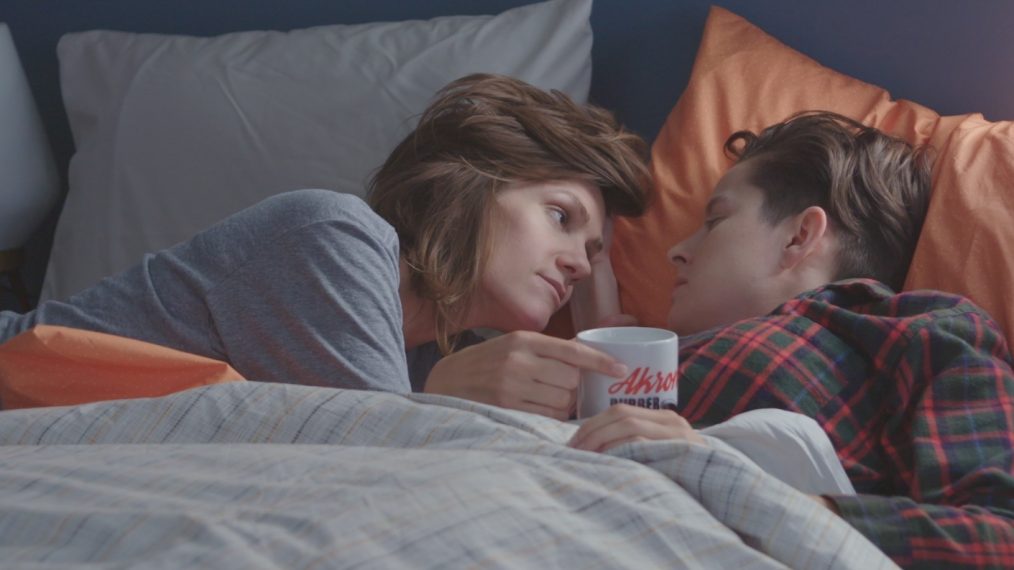
Cameron Esposito and Rhea Butcher
How tough was it to film those moments?
Esposito: I don’t think it was hard to film it. I had a lot of fun. I think it just sometimes it started to get so real that that would be— it was fun, but when we ended up being in the edit and picking the footage that would actually be in the show there were some moments that I felt like I wanted to protect because it was so honest.
Any examples of that?
Esposito: Something that we were not sure about was whether the show would have any nudity or any sex scenes. We talk about it in the show. I really wanted there to be a lot more intimacy and Rhea did not, and Rhea ended up winning that one and I think being extremely right about it, because at the end of the day this is really a sitcom and the comparable shows to this are … This is like I Love Lucy, it’s Lucy Loves Lucy. This is a show about two people that work together and it’s funny and it’s light and it’s sweet, but it’s not super sexy.
There’s a lot of scenes where we’re in bed together and we shot doubles of a lot of those scenes where I am faking nudity and Rhea, when we got into the edit, I was like, “Oh yeah, no you’re totally right. I don’t need to be just naked in all these scenes for some reason. We can have something about our actual lives that people don’t get to see.”
Because you don’t have to spell it out to anyone.
Esposito: That is exactly what I think we figured out, because I think Rhea knew that and I think I had to get up to speed on that, because there is so much boundary pushing comedy these days that I think I had my brain focused on the wrong thing, but yeah, we don’t have to prove it. This isn’t a ‘will they/won’t they’ show, this is a “they did, how the f–k did that happen?”
Butcher:Also, in terms of intimacy what I think I always wanted to make, without really knowing it, is that middle ground of “sitcommy” intimacy where we’re just kissing each other because we’re a couple. There’s no “Whoo!” track from Saved by the Bell being like, “Oh my god, there’s two women kissing!” It’s just two women kissing and they’re also funny and sweet and charming and bumbling and jerks and all kinds of things. It’s just part of the fold of the reality of our life that we would just give each other a quick kiss or whatever, and not everything needs to be slow motion and now there’s really romantic music playing and stuff. It’s just somewhere in between. Lesbians don’t have to always be shirtless and lesbians don’t have to always die.
Take My Wife, Series Premiere, Thursday, August 11, Seeso.
From TV Guide Magazine
How 'Countdown' Recruited Jensen Ackles to Go Full 'Die Hard'
Countdown boss Derek Haas talks creating the character around Ackles, and the cast teases the “Avengers”-like team of the crime thriller. Read the story now on TV Insider.




